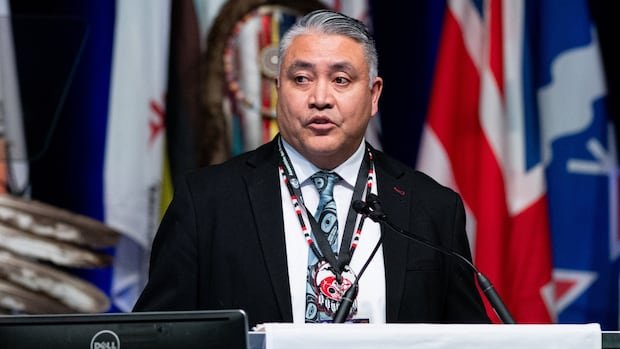In British Columbia, several First Nations leaders are emphasizing the importance of fully implementing the United Nations Declaration on the Rights of Indigenous Peoples (UNDRIP) in Canada, especially as federal election campaigns are in progress.
Terry Teegee, the B.C. regional chief for the Assembly of First Nations, highlighted the significance of the 2021 United Nations Declaration on the Rights of Indigenous Peoples Act as a vital commitment to upholding minimum human rights standards in Crown-Indigenous relationships.
This legislation mandates that Canadian laws adhere to the U.N. declaration, which sets out fundamental standards for recognizing and safeguarding Indigenous rights.
An action plan containing 181 measures for implementing the act has been proposed, and Teegee is advocating for their prompt execution.
Cheryl Casimer, chief of ʔaq’am and a member of the First Nations Summit’s political executive, expressed concerns about the slow progress in implementing UNDRIP, echoing the sentiments of Grand Chief Stewart Phillip from the Union of British Columbia Indian Chiefs, who both emphasized the need for UNDRIP to be a central topic during the election discussions.
Teegee, Casimer, and Phillip, members of the First Nations Leadership Council, a collaborative group advocating for First Nations issues in B.C., shared their perspectives with CBC Indigenous on key priorities.
Addressing International Relations
Casimer commended the provincial government for involving First Nations in discussions concerning tariff threats from the United States and urged similar collaboration at the federal level.
Phillip highlighted concerns about threats to Canadian sovereignty and water from the U.S., underscoring the urgent need for the government to engage with First Nations on these critical issues.
The recent pause in negotiations of the Columbia River Treaty by the United States, which regulates various aspects of the transboundary river, has raised additional apprehensions among Indigenous leaders.
Phillip, Teegee, and Casimer stressed the importance of reconciliation with Indigenous Peoples being a central theme in the election dialogue.
Prioritizing Drinking Water Legislation
Teegee expressed disappointment over the lapse of legislation aimed at ensuring safe drinking water for First Nations due to the prorogation and dissolution of Parliament, calling for renewed efforts in this area.
Casimer underscored the need for adequate infrastructure to maintain clean water sources for both Indigenous and non-Indigenous communities.
Justice and Policing Reform
Teegee emphasized the essential nature of recognizing First Nations policing as a fundamental service nationwide.
Efforts to establish a new framework for First Nations policing, as recommended by the national inquiry into Missing and Murdered Indigenous Women and Girls, received over $43 million in funding in the 2021 federal budget.
Casimer called for progress on the 231 calls for justice and reducing Indigenous representation in the justice system, while Teegee advocated for amending the criminal code to criminalize residential school denialism.
Aside from these critical issues, concerns were also raised about child and family services, the opioid crisis, and gender-based discrimination in the Indian Act.
While Teegee and Casimer refrained from endorsing any specific political party, they emphasized the benefits of recognizing the rights and title of First Nations for promoting stability and cooperation with government and industry.
Phillip expressed his support for the NDP, citing their receptiveness to First Nations concerns and his longstanding admiration for Jagmeet Singh.

